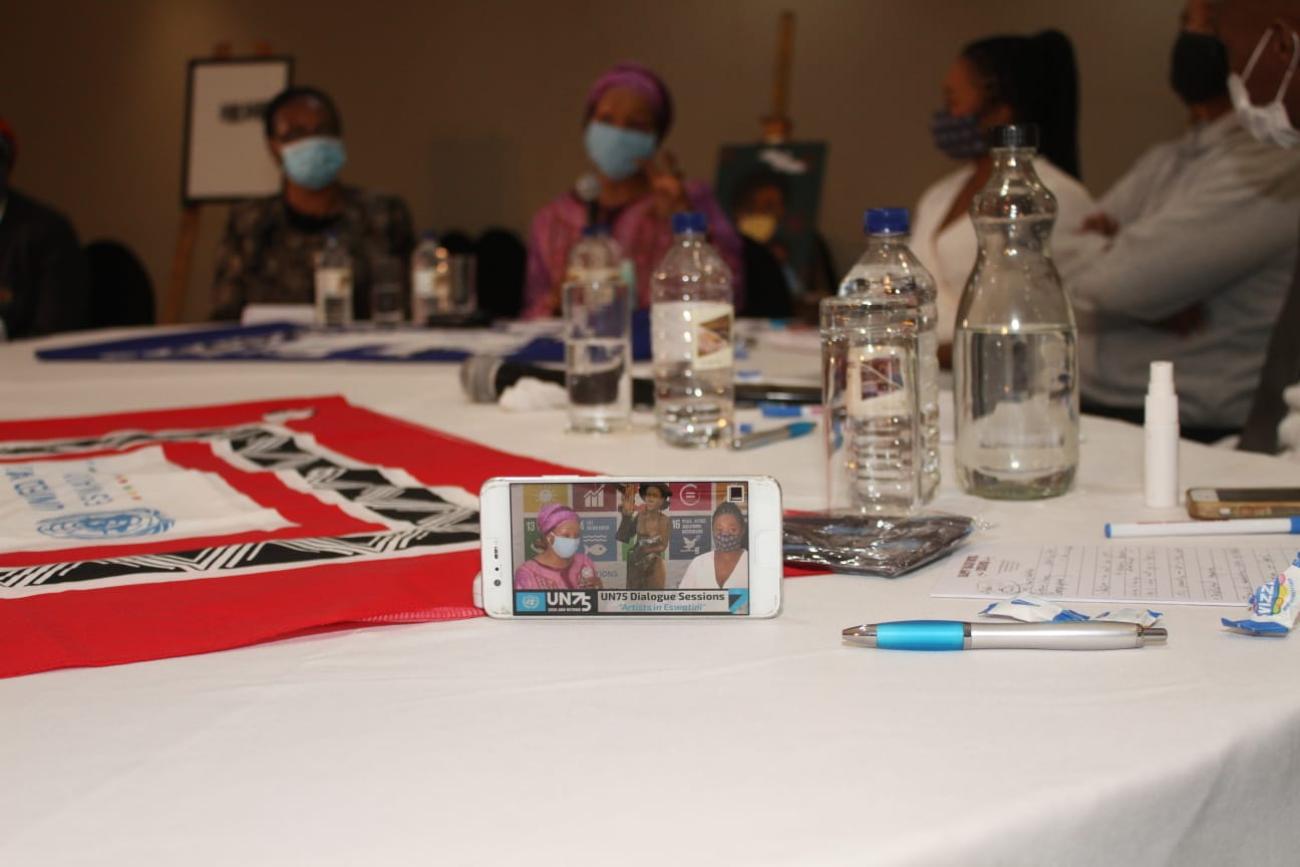The UN Shares an Interesting and Important UN75 Dialogue with Artists in Eswatini

In collaboration with Yebo Contemporary Art Gallery, on Friday, 14th August, the UN hosted an eye-opening UN75 Dialogue with artists across the nation.
On Friday, 14th August, in collaboration with Yebo Contemporary Art Gallery, the United Nations hosted a revealing UN75 dialogue with artists from across the country. Yebo Contemporary Art Gallery showcases the best of art and design in Eswatini, working together with the most talented professional and emerging artists nationwide. The contemporary art gallery seeks to break away from old-fashioned stereotypes of African art and give artists the opportunity to gain wider domestic and international recognition.
Artists travelled across the country to participate in the important conversation, as artists are increasingly vulnerable to being left behind in the world’s recovery from COVID-19. Music producers, performing musicians, dancers, poets, writers, visual and handicraft artists, theatre performers, graphic designers and fashion designers joined the dialogue.
Recognising the pivotal role of art, the UN Resident Coordinator, Ms Nathalie Ndongo-Seh, stated in her opening remarks; “Art demonstrates people’s resilience in times of suffering, so they may build back better, stronger, greener and fairer. Art nurtures creativity, innovation and cultural diversity for all peoples across the globe and plays an important role in sharing knowledge and encouraging curiosity and dialogue.”
Artists are crucial in the country’s recovery from COVID-19. However, the pandemic and subsequent lockdowns have drastically affected artists across the nation and worldwide.
Poets shared that they are, “struggling to make ends meet without access to performances”. So too did participants share that categorizing artists as non-essential, without considering how events and performances would take place following WHO guidelines, was devastating to the industry.
“The Internet and digital space has flattened the arts industry globally, hence, Eswatini artists have to produce or create art that can compete globally in order to capture audiences locally and globally,” expressed an attendee. Internet charges and low Internet speed across Eswatini makes it difficult for artists to perform and compete online during the pandemic.
In consideration of an inclusive and prosperous future for artists, participants shared that they’d like to see a world in which creative thinking is embraced, open-minds and creativity are encouraged throughout the education process, generations of dreamers come to flourish and artists play a pivotal role in fighting climate change: “As artists, we need to bring hope and faith and generate action. Artists need patrons, grants, residences and support systems to earn a living. We need guaranteed freedom of speech,” stated artist and Yebo Art Gallery co-founder, Dane Armstrong.
Attendees shared solutions to the issues that they are facing, suggesting that copyright and intellectual property laws are passed to protect artists, artists and youth are given a voice and role in decision-making, the exploitation of artists is investigated by relevant bodies and fair compensation assured, #BuyEswatini is promoted nationwide, the arts are prioritised and supported by the Government as a vital industry and art supplies are made locally as opposed to imported.
The UN Resident Coordinator expressed to participants that; “The UN system in Eswatini would thus like to pay tribute to the solidarity shown by artists and institutions at a time when art is suffering the full force of the effects of a global health, economic and social crisis, and artists are faced with loss of livelihoods. You matter, your work matters, your experiences matter and your contributions to society and our cultural heritage are highly valuable.”
She continued that; “Your rights in the arts industry are just as important as those in any industry, and they must be upheld and protected. The Kingdom of Eswatini ratified the UNESCO Convention on the protection and promotion of the diversity of cultural expressions in 2012, and we are here today to continue this support to the arts industry in the country. We support key policies such as the Swaziland National Arts and Culture Policy and the Swaziland National Trust commission Act of 1973 that protect your rights and your work.”
The important issues raised in the dialogue will be shared in the UN General Assembly in September, in which the Kingdom of Eswatini will serve in the honoured position of Vice President.

















